
East Rock | Economic Development | Arts & Culture
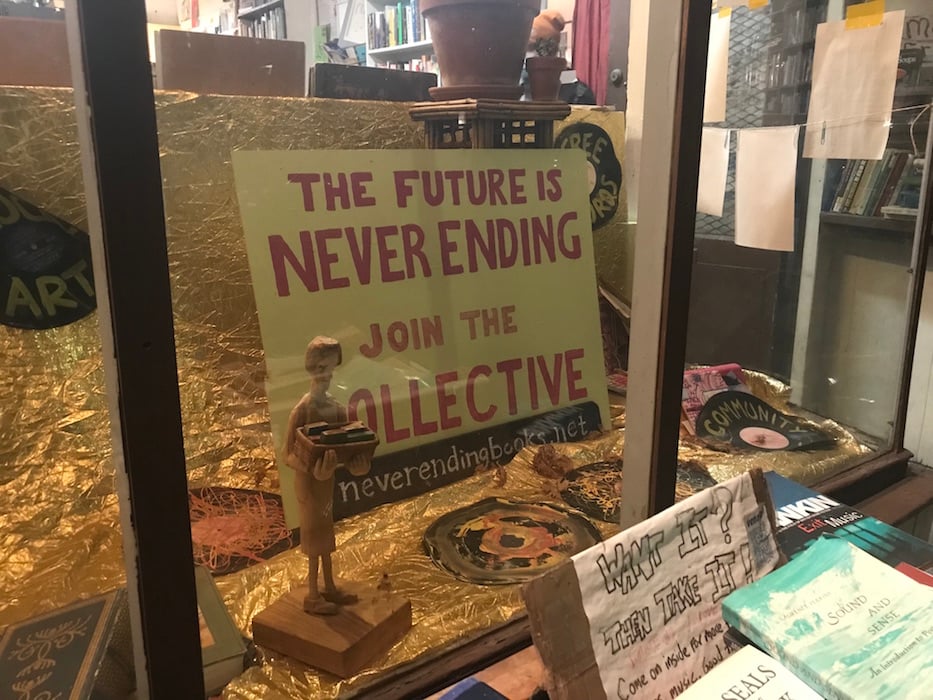
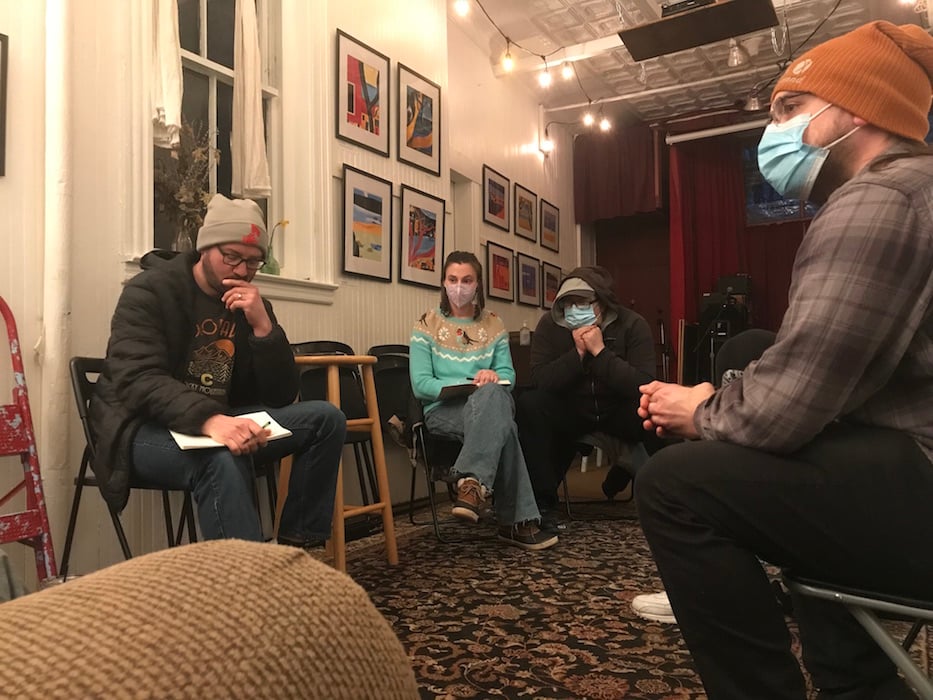 Volume 2: A Never Ending Books Collective on a recent Wednesday night. Al Larriva-Latt Photos.
Volume 2: A Never Ending Books Collective on a recent Wednesday night. Al Larriva-Latt Photos.
“Yeah,” the six people assembled in the room sang. Their voices—a mixture of tones, textures and pitches—bounced off the walls of the rectangular event space. “Yeah, yeah, yeah, yeah, yeah.” Some strummed guitars. One person beat a drum.
The “Yeah, Yeah Song”—the only original song written by Never Ending Books (NEB) founder Roger Uihlein—filled Volume 2: A Never Ending Books Collective last Sunday, as “Roger’s Brick Wall” capped off a stream of weekly programming at the space. A year after becoming a collective, the State Street storefront has expanded its mission to offer weekly programming in the space. It’s also seeking nonprofit status. As it works toward that goal, collective members are aiming to keep it free and accessible as possible.
“There are a lot of places where you have to either pay money to get a stage time or whoever has ownership of the stage has to be convinced that you will bring in paying customers,” said collective member Jules Bakes. “If you can’t do either of those things, this is the place for you.”
The bookstore-and-event space at 810 State St. is undergoing a transition period, as it moves from a self-funded studio and performance space by Uihlein to a nonprofit model run by a collective. Underpinning members’ efforts is a desire to maintain the sense of openness and freedom of Never Ending Books, while bringing both short- and long-term improvements to its model.
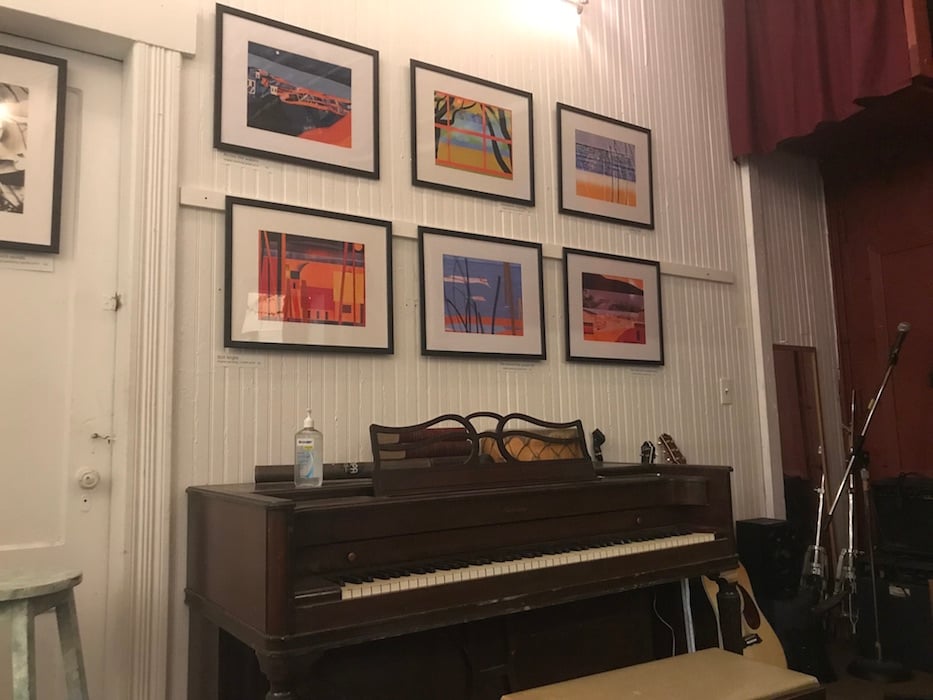
Art on view for Shula Weinstein's upcoming exhibition, which opens April 2.
Part of that is honoring the history, said collective member Elena Augusewicz. Never Ending Books started in the 1990s as a free bookstore and an adjoining, equally free event space. Over the years, all manner of groups held events in the storefront, from herbalists to Communists, experimental noise rockers, electronic musicians, and improv comedians. There was no barrier to entry.
It ran on and off again on that “staunchly anti-capitalist” model, Augusewicz said. By the time NEB reached its final years, that collective had dwindled to a single person. Uihlein was running NEB by himself.
Uihlein paid the rent and utilities and split the telephone bill with Rainbow Recycling, with whom he shared the office in the back. He booked the shows (open to anyone), managed and maintained the books (free, with donations encouraged), opened and closed the shop, and performed all the miscellaneous labor associated with running the space.
The space was entirely funded by Uihlein and the community. Whenever visitors took books from the shelves or attended an event at the adjoining space, he encouraged them to stuff a few bills in the tip box on the back counter when they took books from the shelves or attended an event at the adjoining space.
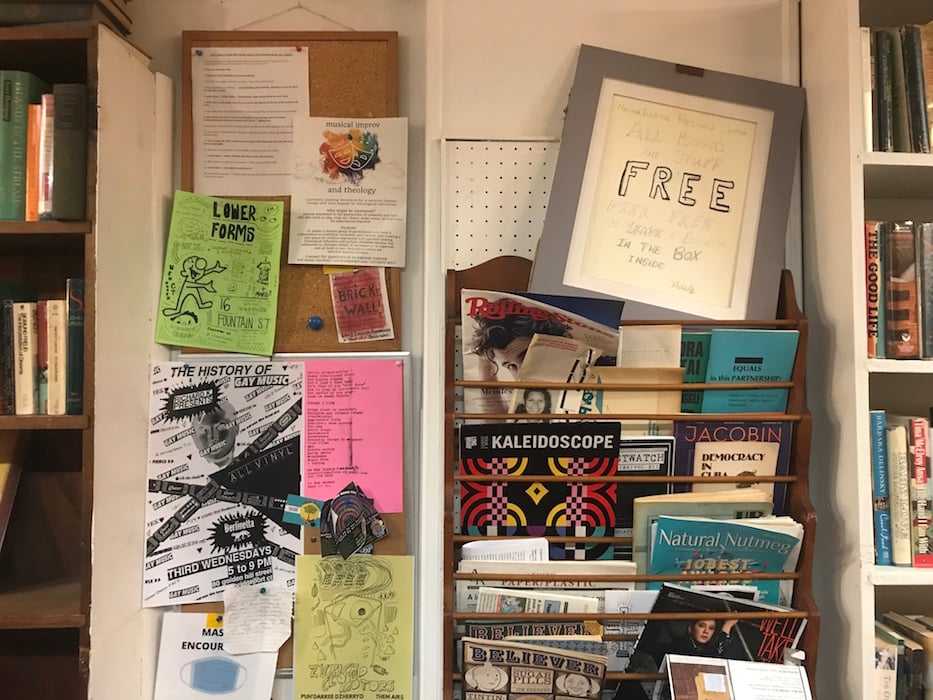
That model became unsustainable. With the onset of the Covid-19 pandemic, community members weren’t stopping by at the same rates they once had. In late December 2020, a full nine months into the pandemic, Uihlein announced that Never Ending Books was closing.
A month later, in January 2021, a group of Never Ending Books’ fans—from experimental musicians and young artists to poets—started meeting on Zoom. Helmed by musician Sam Moth, who performed many times at the storefront, they started brainstorming ways to keep the space at 810 State St. open. At their peak, the Zoom calls were 50 members deep, filled with long-time Never Ending Books-goers and people who’d just learned of the cause. There was a huge amount of momentum—and energy.
“It was like real wild and a lot going on and kind of crazy,” Augusewicz remembered.
The goal of the newly formed collective—dubbed Volume 2, was to raise enough money to cover the first few months worth of rent. They started a Kickstarter campaign for expenses.
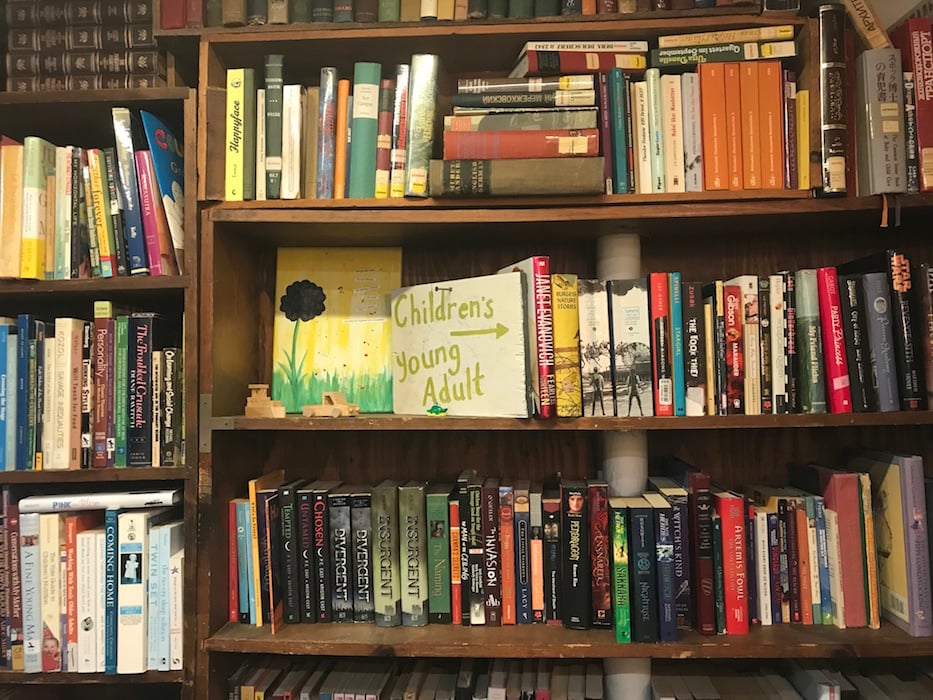
The collective’s goal was $12,500. Donors exceeded it by a full 36 percent, bringing their total funds raised to $17,000. That amount was enough to stay in the space for a full year. Uihlein stepped in to cover the electrical bill. Rainbow Recycling continues to pay the phone bill—a 90s-era landline with an attached answering machine. The low overhead costs which remain each month have been covered by the tip jar, which they continue to encourage people to donate to when taking books or attending events.
A full 14 months later, much remains the same as the group works toward nonprofit status. They remain volunteer-run, and completely free; anyone can book their event space. There are the hand-painted signs attached to the store front, the same whitewashed moldings of the high ceiling, and the same ethos of pulling together to make things happen. In a given week, offerings might include a screening of a cult classic film; a jam session for trans and nonbinary, and genderqueer musicians; and a set by a long-time Connecticut pop group whose founding guitarist and drummer who have been married for the past two decades.
“We want to keep it as, like, similar to what it was as we can,” Augusewicz said, adding that Uihlein had already done the hard work of pioneering the model.
“The framework was already here. The heavy lifting wasn’t like, what are we gonna do in this empty space. The heavy lifting is like, how do we keep this thing the way we all like it that doesn’t seem gentrify-y or disrespectful or crappy.”
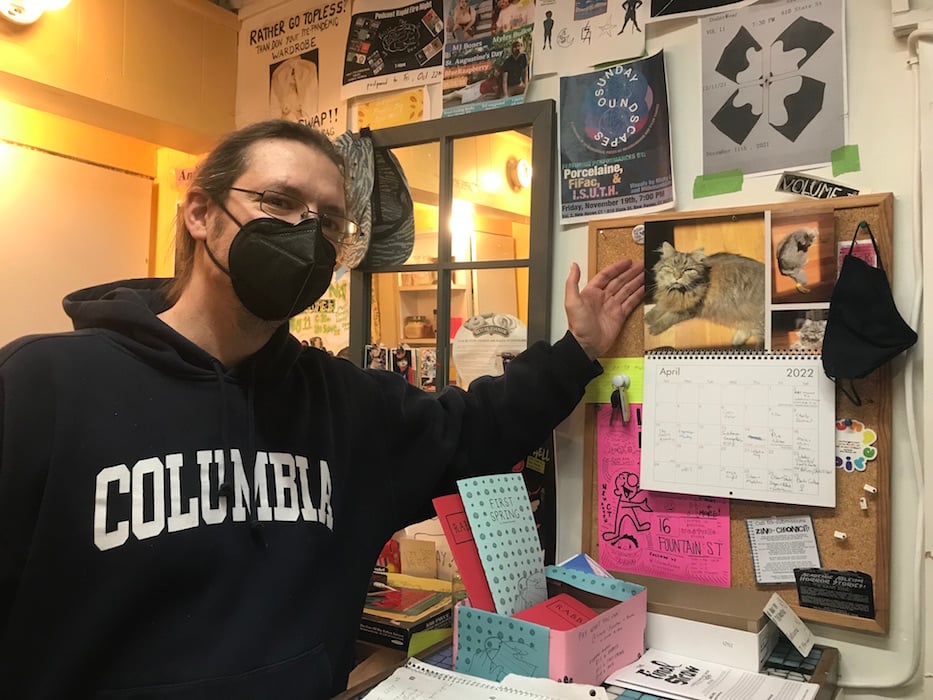
Volume 2 collective member Ryan Licwinko at the back desk, next to the customized 12-month calendar of his cat Max.
Since the early days when the collective was 50 members deep, membership has solidified into a smaller core group. At the most recent staff meeting, a group of eight members of the collective gathered in the event room, perched atop a patchwork collection of chairs, stools, and benches. Some, like Augusewicz, Peter Cunningham, and Bakes, were old regulars. Others, like Alix Hunter and Caroline Tippett, were newer to the space. Collective members later said that it's not uncommon for members to come and go: their governing body is always slightly in flux.
Augusewicz pulled out her smartphone and read the collective’s latest success: since they reopened as Volume 2, the group has hosted 80 different events. The demand for the space is beginning to outpace weekly stage time. Volume 2 is now booking out until July.
There’s the newest hurdle: raising enough money for the next 12 months. As city rents skyrocketed last year, the collective members’ biggest fear was 810 State St. turning into another Panera—which hasn't happened yet. Augusewicz and Hunter, both of whom have experience in development, have been working closely on multiple grant applications and fundraising events. The main event is a night of live music, board games, and beverages tentatively dubbed the Great Give-a-Palooza, timed to coincide with New Haven’s Great Give.
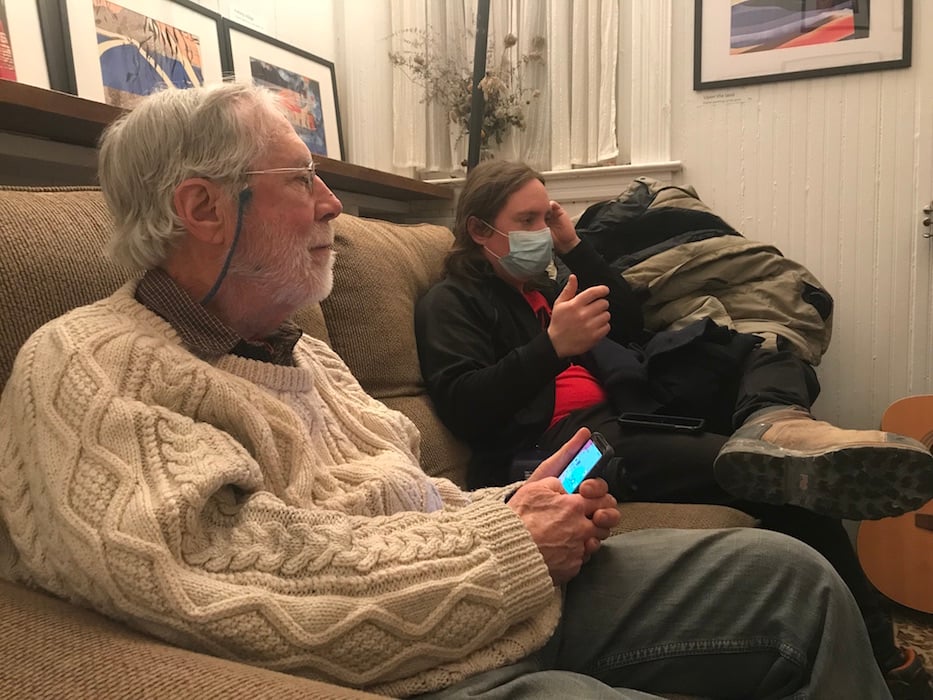
The Socialist Revolution CT meets at Volume 2 every week.
Volume 2’s members believe that becoming a nonprofit is key to the collective's long-term financial sustainability, they said in a recent meeting. When members raised $17,000 from the 2021 Kickstarter campaign, they had to write off the amount on their taxes as a collective, rather than as a single entity. After they solicited a number of local organizations for advice, Yale’s Dwight Hall stepped in as a temporary fiscal agent. That means that they lent them their 501c3 tax ID.
The model is ultimately one that the storefront wants for itself. Becoming a 501c3 would give the collective its own tax ID—and all the tax benefits associated with being a nonprofit. It would also encourage people to donate larger amounts, given the ability to write it off on their taxes.
In January 2022, the collective formed a board. It has since started filling out the paperwork for 501c3 status.
But in the meantime, members are also celebrating the success of their first year post-transition—and raising the funds to make a second year possible.
Last Sunday afternoon, the space welcomed the Bad Singers United! (also known as the Never Ending Backup Singers and the Singing Lab). Organized by Uihlien, they’ve been convening every Sunday for the past three months with the goal of creating an environment in which any manner of the people who walk into the room can practice their back up singing abilities.
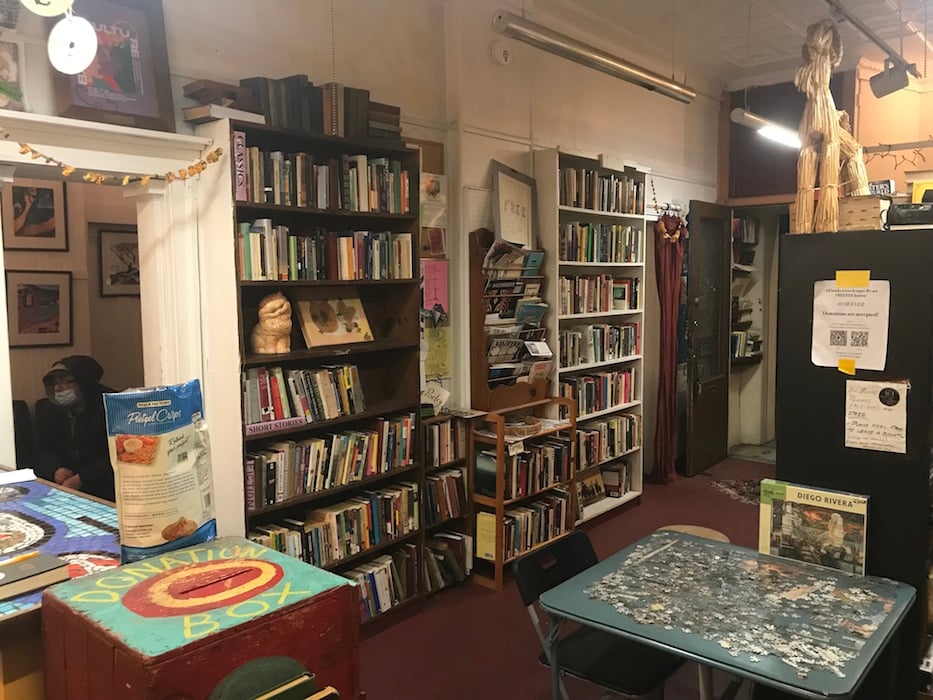
There were a few basic rules: no photo- or video-taking; no professional musicians; and no listeners. Everyone had to make noise—play, sing, read poetry, whistle, make bird calls. If the list of “do nots” seemed large or restrictive, the list of what participants could do was endless.
At one point, a participant dived in from where he had been browsing for books and began reciting from Walt Whitman’s Leaves of Grass to the beat of the back-up singers and instrumentalists. Uhlein joined in, reciting from his own hand-bound collection of poems including Whitman.
It was a full-circle moment. While he no longer runs the space, Uihlein is a regular presence in the storefront. He still has a way of coaxing people into participation—and transforming ordinary spaces into safe havens for creativity. It’s something he has been doing for the past 25-odd years and is continuing to do at these weekly events.
During the two-hour session, he convinced the musicians—some who had been playing from childhood into middle age, others who could count the years they’ve been playing on one hand—to lead the group in song. He caught participants’ eyes and with a reassuring nod, invited them to jump in with a contribution.
Where else could Bad Singers United! find such a welcoming home?
Learn more about Volume Two here.

